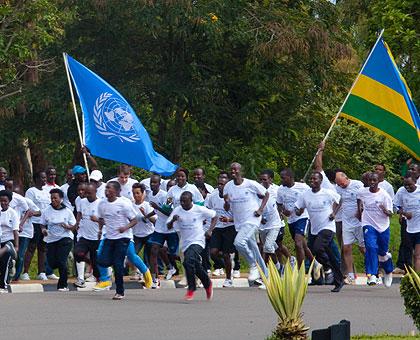While pledging responsible journalism, Rwandan journalists have urged others to also respect their work during this year’s World Press Freedom Day celebrations on Friday.


While pledging responsible journalism, Rwandan journalists have urged others to also respect their work during this year’s World Press Freedom Day celebrations on Friday.
The event kicked off with a mini-marathon in the morning and followed by discussions.
Journalists spoke about gains made with regards to press freedom in the last 20 years and steps needed to sustain the achievements.
Fred Muvunyi, the chairperson of the Rwanda Media Commission (RMC), the media self-regulatory body, thanked the government for enacting laws that have helped advance media freedom.
Rwanda recently instituted reforms aimed at enhancing freedom of the press such as the Access to Information Law that was enacted in March 2013.
Under the new media laws, journalists are able to regulate their work through the RMC, an arrangement that both journalists and government officials say has so far yielded fruits.
"It’s a sign of satisfaction,” Muvunyi told a gathering of journalists, researchers, government officials, and members of the civil society.
But journalists say more needed to be done to consolidate these gains.
Muvunyi told the Minister of Local Government, James Musoni, during the function that the government should consider decriminalising defamation to foster more independence and freedom of the media.
The head of the media fraternity has also pleaded with the government to help journalists bring to the attention of some of their employers in the private sector that they too need to be paid on time, just like other workers.
Musoni agreed that many improvements in the media sector have been recorded in the last few years, especially since journalists started regulating themselves under the RMC.
"We have done a lot as far as putting in place laws and institutions that enable press freedom is concerned,” he said.
The minister noted the ability by journalists to regulate themselves and the increased awareness of Rwandans about the work of journalists.
He urged them to keep up a level of professionalism that protects both journalists and the public.
"Sometimes journalists may think that the RMC is there to protect them only, but the commission has also got a component to protect the public in its mandate,” he said.
Various discussions in the meeting rotated around responsible journalism, a niche that experts described as ‘constructive journalism’ as they courted journalists to focus more on stories that help their country develop by improving people’s lives.
"Let’s see how the press freedom we need is used for (public) benefits. Constructive journalism begins with thinking about what you want to achieve,” said media trainer Emmanuel Rushingabigwi.
He gave the lecture on constructive journalism alongside Dr Raphael Nkaka, a historian and lecturer at the University of Rwanda who also teaches journalism students at the university.
Dr Nkaka said that it is pointless for people to say that there is no freedom of expression in Rwanda because in countries without freedom of expression people are not given a chance to even talk about it.
"There is freedom but it doesn’t mean there is enough,” he said, urging journalists to keep talking about how they can improve the media sector.
Muvunyi has encouraged fellow journalists to keep up the fight for their freedom, saying in a well articulated speech that "freedom of expression is fought for and not only demanded”.
The United Nations has chosen the focus for this year’s World Press Freedom Day to be on three inter-related themes: The role of the media in development, the safety of journalists and the rule of law, and the sustainability and integrity of journalism.
In a joint statement related to the World Press Freedom Day this year, UN Secretary-General Ban Ki-moon and UNESCO Director-General Irina Bokova highlighted the role of journalism in enabling good governance.
"Journalism provides a platform for informed discussion across a wide range of development issues – from environmental challenges and scientific progress to gender equality, youth engagement and peace building. Only when journalists are at liberty to monitor, investigate and criticise policies and actions can good governance exist,” the two diplomats said.
World Press Freedom Day is normally an opportunity to celebrate the fundamental principles of press freedom, assess the state of press freedom throughout the world, defend the media from attacks on their independence, and pay tribute to journalists who have lost their lives in the line of duty.


